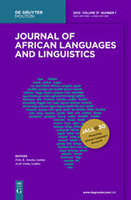
Journal of African Languages and Linguistics
Scope & Guideline
Fostering Dialogue on Africa's Linguistic Diversity
Introduction
Aims and Scopes
- Linguistic Diversity and Typology:
The journal emphasizes the rich linguistic diversity on the African continent, encouraging studies that engage with typological comparisons among languages across different families. - Grammaticalization and Language Change:
Research on grammaticalization processes and diachronic changes in African languages is a core focus, examining how languages evolve over time. - Phonology and Prosody:
The journal publishes works that explore phonological systems, tone, and prosodic features of African languages, highlighting their unique characteristics and functions. - Morphosyntactic Structures:
Investigations into the morphosyntactic properties of African languages, including noun classes, agreement systems, and clause structure, are central to the journal's offerings. - Sociolinguistics and Pragmatics:
The journal also addresses sociolinguistic factors affecting language use and variation, exploring how cultural contexts shape linguistic practices.
Trending and Emerging
- Diachronic Linguistics:
There is a notable increase in research examining diachronic perspectives, particularly how languages change over time, as demonstrated by the growing number of studies on grammaticalization. - Microvariation and Language Variation:
Research on microvariation within language families, such as the subtle differences in usage and structure among closely related languages, is becoming more prominent. - Embodiment in Language:
The exploration of how physical experiences shape language and meaning, particularly in the context of feeling lexica, is emerging as a significant theme in the journal's recent publications. - Cross-Categorial Studies:
Recent works have shown a rising interest in cross-categorial classifications, particularly in how nouns and verbs interact within specific languages, indicating a trend towards more integrative linguistic analysis.
Declining or Waning
- Historical Linguistics:
While historical perspectives on African languages were previously more prevalent, recent issues show a decline in papers explicitly focused on reconstructing language histories or proto-languages. - Language Documentation:
The emphasis on documenting lesser-known languages has waned, with fewer studies dedicated solely to the documentation and preservation of endangered African languages. - Comparative Linguistics:
Comparative studies between African languages and non-African languages have become less common, indicating a shift towards more localized or specific investigations.
Similar Journals
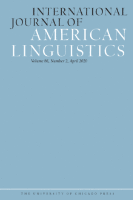
INTERNATIONAL JOURNAL OF AMERICAN LINGUISTICS
Pioneering Research in the Dynamics of Language.The INTERNATIONAL JOURNAL OF AMERICAN LINGUISTICS, published by University of Chicago Press, is a revered scholarly publication dedicated to the exploration and advancement of linguistic studies, particularly those related to the American linguistic landscape. With an ISSN of 0020-7071 and an E-ISSN of 1545-7001, this journal serves as a vital platform for researchers, professionals, and students interested in the nuances of language, dialects, and linguistic structures through rigorous academic inquiry. The journal has established a commendable impact, reflected in its ranking within the Q2 category in Linguistics and Language and its placements in the Scopus rankings, thereby positioning itself within the 50th to 53rd percentile of its respective fields. While the journal does not provide Open Access options, it continues to be a cornerstone resource for those seeking to expand their understanding of American linguistics, already converging from 1996 to 2024. Through its continued commitment to excellence, this publication remains essential for those aiming to contribute significantly to the field.

Journal of Jewish Languages
Unveiling the Cultural Dimensions of Jewish LanguagesThe Journal of Jewish Languages, published by BRILL, is a leading academic platform dedicated to the interdisciplinary study of Jewish languages, exploring their historical, cultural, and linguistic dimensions. With an ISSN of 2213-4387 and an E-ISSN of 2213-4638, this journal serves as a vital resource for researchers and students, offering insights into the evolution and significance of Jewish linguistic traditions from 2015 to 2024. As a Q3-ranked journal in the fields of Cultural Studies and History, and a Q4 ranking in Linguistics and Language, it presents a diverse array of scholarly articles that contribute to the understanding of Jewish languages in various cultural contexts. With commendable Scopus rankings that place it within the 60th to 75th percentile across multiple categories in Arts, Humanities, and Social Sciences, the Journal of Jewish Languages continues to be a pivotal venue for innovative research and dialogue. While the journal is not open access, it nonetheless remains an essential reading for anyone vested in the linguistics and cultural aspects of Judaism.
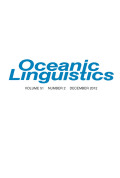
OCEANIC LINGUISTICS
Celebrating the Vibrancy of Pacific LinguisticsOCEANIC LINGUISTICS is a premier academic journal published by UNIV HAWAII PRESS, dedicated to the study of languages spoken in the Pacific region. This esteemed journal, bearing ISSN 0029-8115 and E-ISSN 1527-9421, serves as a vital platform for linguists, researchers, and scholars to disseminate significant findings and insights related to Oceania's rich linguistic diversity. With a commendable impact factor and categorized in the Q2 Quartile for the field of linguistics and language, OCEANIC LINGUISTICS ranks 335th out of 1088 in Arts and Humanities and 395th out of 1167 in Social Sciences, reflecting its relevance and influence in ongoing linguistic discourse. The journal is a subscription-based publication, committed to advancing research and fostering scholarly communication from 2004 to 2024, making it an essential resource for anyone engaged in the study of linguistic phenomena in the Oceania region and beyond.
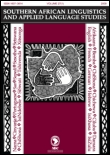
Southern African Linguistics and Applied Language Studies
Elevating Southern African Voices in Language StudiesSouthern African Linguistics and Applied Language Studies is a prestigious journal dedicated to the exploration and analysis of linguistics and applied language studies within the Southern African context. Published by Taylor & Francis Ltd, this esteemed journal has established itself as a significant platform for scholars and practitioners since its inception in 2003. With an impressive Q2 ranking in the Linguistics and Language category and a current Scopus rank of #430 out of 1167, it occupies a vital position in the academic landscape, appealing to a diverse readership keen on linguistic research, language policy, and applied linguistics. While the journal is not currently open access, it provides comprehensive insights and scholarly articles that foster understanding and innovation in linguistic practices and language education. As of 2024, the journal continues to deepen its impact through rigorous peer-review and a commitment to advancing knowledge, making it a key resource for researchers, educators, and students seeking to navigate the complexities of language within the Southern African region and beyond.

Language and Linguistics
Bridging Theory and Practice in Linguistic ResearchLanguage and Linguistics is a leading academic journal published by ACAD SINICA, INST LINGUISTICS, based in Taiwan. Established in 2008, this journal has rapidly gained recognition within the field of linguistics, achieving a commendable ranking of Q2 in the 2023 category quartiles and holding positions in the top percentiles of Scopus rankings for both Arts and Humanities and Social Sciences. With an ISSN of 1606-822X and an E-ISSN of 2309-5067, the journal aims to foster the development of linguistics research by providing a platform for the dissemination of innovative and interdisciplinary studies. While it currently operates on a traditional subscription model, its significant contribution to the advancement of linguistic theory and its applications makes it an invaluable resource for researchers, professionals, and students alike. Spanning converged years from 2008 to 2024, Language and Linguistics continues to shape the dialogue in understanding language phenomena and encourages submissions that push the boundaries of current linguistic knowledge.

NATURAL LANGUAGE & LINGUISTIC THEORY
Charting New Territories in Natural Language TheoryNATURAL LANGUAGE & LINGUISTIC THEORY, published by Springer, stands as a premier journal in the field of linguistics, characterized by its rigorous examination of theoretical frameworks and current research trends within natural language. With the ISSN 0167-806X and E-ISSN 1573-0859, this journal has maintained a stellar reputation since its inception in 1983, consistently ranked in the Q1 category for Linguistics and Language as of 2023. Its impressive standing in Scopus ranks (#127 in Arts and Humanities and #143 in Social Sciences) further underscores its influence, occupying the 88th and 87th percentiles respectively. Although the journal does not provide Open Access options, it remains a vital resource for scholars and practitioners seeking to deepen their understanding of the nuances of linguistic theory. The journal's scope encompasses a wide array of topics relevant to both theoretical analysis and practical applications in linguistics, making it essential reading for anyone engaged in the study of language sciences.

Glossa-A Journal of General Linguistics
Connecting Scholars in the World of LinguisticsGlossa: A Journal of General Linguistics, published by the Open Library of Humanities, stands as a leading voice in the realm of linguistic research since its inception in 2016. With its Q1 category ranking in Linguistics and Language and impressive Scopus ranks encompassing the top 83rd and 81st percentiles in its respective fields, Glossa fosters a vibrant academic community committed to the rigorous exploration of language and linguistic theory. Operating under an open access model, the journal not only enhances the visibility of groundbreaking research but also ensures that valuable insights are accessible to a global audience. The journal's commitment to interdisciplinary dialogue makes it an indispensable resource for scholars, professionals, and students eager to engage with contemporary developments in linguistics. As it converges into 2024, Glossa continues to champion innovative scholarship and critical discourse that challenges conventional boundaries within the field.

Revista Virtual de Estudos da Linguagem-ReVEL
Fostering Global Dialogue in LinguisticsRevista Virtual de Estudos da Linguagem-ReVEL is a prominent academic journal dedicated to the field of linguistics, published by REVISTA VIRTUAL ESTUDOS LINGUAGEM in Brazil. With its ISSN 1678-8931, ReVEL aims to provide a platform for scholarly communication and dissemination of research across diverse areas of language studies, including sociolinguistics, language acquisition, and discourse analysis. As an open-access journal, it fosters accessibility to important linguistic research, allowing researchers, educators, and students alike to engage with the latest findings without subscription barriers. The journal’s focus on innovative methodologies and interdisciplinary approaches makes it a valuable resource for those seeking to deepen their understanding of language dynamics in various contexts. By contributing to the growing body of knowledge in this field, ReVEL plays a crucial role in promoting scholarly dialogue and enhancing the visibility of Brazilian linguistic research on a global scale.

Studi e Saggi Linguistici
Cultivating a Rich Exchange of Ideas in LinguisticsStudi e Saggi Linguistici is a distinguished academic journal published by EDIZIONI ETS, based in Pisa, Italy. With its ISSN 0085-6827, this journal has established itself as a vital resource in the field of linguistics, particularly noted for its contributions since its inception in 2016. Although currently categorized in the lower quartile (Q4) by the 2023 metrics in the domains of Linguistics and Language within Scopus, it remains a significant platform for innovative research and critical discussions surrounding language studies. Focusing on both theoretical and practical aspects of linguistics, the journal serves as a nexus for scholars and practitioners alike, facilitating a rich interchange of ideas and knowledge in a rapidly evolving discipline. As an invaluable publication for researchers, professionals, and students, Studi e Saggi Linguistici is committed to advancing the understanding of linguistic phenomena and fostering scholarly communication in its field.
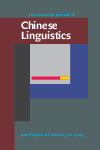
International Journal of Chinese Linguistics
Exploring the Depths of Chinese LinguisticsInternational Journal of Chinese Linguistics is a distinguished publication that delves into various aspects of linguistic studies pertaining to the Chinese language. Published by John Benjamins Publishing Co, this journal stands out for its commitment to advancing the knowledge and understanding of Chinese linguistics within the global academic community. With an impact factor that places it in the Q2 quartile of linguistics and language, the journal is indexed in prominent databases, achieving ranks of #501 in Arts and Humanities and #580 in Social Sciences. These rankings reflect the journal's dedication to maintaining high scholarly standards and its relevance in both linguistic research and practical applications. While not categorized as Open Access, the journal provides necessary access through institutional subscriptions, thereby ensuring that valuable research reaches a broad audience. Covering a wide range of topics from syntax and phonetics to sociolinguistics and applied linguistics, the International Journal of Chinese Linguistics serves as an essential resource for researchers, professionals, and students seeking to deepen their understanding of the intricate relationship between language and culture in the Chinese context. With converging years from 2019 to 2024, it continues to evolve, reflecting ongoing developments in the field.